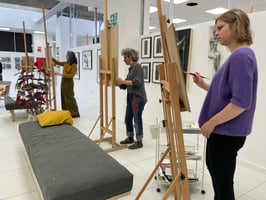Explore the enduring significance of academic art in contemporary artistic education and practice,...
How do I get more creative?
Creativity is a valuable asset in today's fast-paced, constantly-connected world. And fortunately, it's something that can be cultivated. If you're looking for ways to be more creative, here are some tips to get you started.
What is creativity?
Creativity is the ability to come up with new and original ideas. It is a process that involves generating new ideas, and then turning those ideas into reality.
There are many benefits to being creative, including improved problem-solving skills, enhanced communication abilities, and increased productivity.
So, how can you become more creative?
There is no one creativity process that works for everyone, but there are some general steps that can help you become more creative. These steps include brainstorming, mind mapping, and using creative prompts.
- Brainstorming is a great way to generate new ideas. To brainstorm effectively, try to come up with as many ideas as possible, without judging them. Just let the ideas flow. Once you have a long list of ideas, you can start to narrow it down and see which ones are the most promising.
- Mind mapping is another helpful tool for generating new ideas. To create a mind map, start by writing down a central idea in the middle of a piece of paper. Then, draw lines out from the central idea, and write down related ideas on those lines. This can help you to see the relationships between different ideas, and can spark new ideas-
- Creative prompts are another useful tool for sparking creativity. A creative prompt is simply a prompt or prompt question that encourages you to come up with new ideas. For example, you could try responding to the prompt, "What would you do if you couldn't fail?" with as many ideas as possible.
So, there you have it: a brief introduction to creativity and some of the ways that you can improve your creativity. Now it's time to get out there and start being creative!
If you're not a creative person, you might be wondering what all the fuss is about.
Why are people always talking about the importance of being creative?
Well, there are actually quite a few good reasons. Here are just a few of the benefits of being creative:
1. Improved problem-solving skills: When you're creative, you're able to see problems from different perspectives and come up with innovative solutions.
2. Enhanced communication skills: Being creative allows you to communicate your ideas more effectively.
3. Greater life satisfaction: People who are creative are generally more satisfied with their lives.
4. Improved mental and physical health: Creativity has been linked with better mental and physical health.
5. Enhanced teamwork skills: Creative people are often good at working in teams and collaborating with others.
6. Increased job satisfaction: People who are creative often enjoy their jobs more and are more satisfied with their careers.
7. Greater financial success: Creative people are often more successful financially.
As you can see, there are quite a few good reasons to develop your creativity. If you're not already a creative person, it's never too late to start developing your creativity. Who knows, you might find that you enjoy it more than you ever thought possible!
How do you get more creative?
There are a number of ways you can start developing your creativity. Here are a few suggestions:
1. Take an art or music class.
2. Start journaling.
3. Take up a new hobby.
4. Spend time outside in nature.
5. Experiment with new things.
6. Be open to new ideas.
7. Don't be afraid to make mistakes.
Developing your creativity can be a fun and rewarding process. So why not give it a try? You might be surprised at what you're capable of!
What is a creativity process?
The creativity process is the journey that an idea takes from its initial conception to its finished product. It is often said that there are three stages to the creativity process: preparation, incubation, and illumination.
Preparation is all about gathering information and getting everything in order. This is the stage where you do your research, brainstorm ideas, and plan everything out. Once you've done your preparation, it's time to move on to the next stage: incubation.
Incubation is when you let the idea gestate and percolate. This is the stage where you take a break from thinking about the project, and let your subconscious mind work on it. This is often seen as the most critical stage of the creativity process because it's when the actual creative work is done.
Finally, once you've given your idea time to incubate, it's time for the moment of truth: illumination. This is the moment of creative insight, when the lightbulb goes off and you have that "Aha!" moment. This is when the idea comes together and you can start putting it into a finished form.
Of course, the creativity process is not always linear. You may find yourself moving back and forth between these stages as you work on your project. But understanding the basics of the creativity process can help you get unstuck and start making progress
How can you improve your creativity?
There are many different techniques that can be used to improve creativity, but some of the most popular ones include brainstorming, mind mapping, and using creative prompts. So the next time you're feeling stuck, remember: there's a process for that.
If you're like most people, you probably think of creativity as something that you're either born with or not. You might look at some of the world's most successful people and wonder how they came up with their brilliant ideas. But the truth is, creativity is not a mystical quality that only a lucky few possess. It is a process that can be learned and developed.
There are many ways to become more creative. Some ways to develop creative thinking skills include brainstorming, mind mapping, asking questions, and taking risks. It is also important to be open-minded and to embrace change.
One of the best ways to become more creative is to break out of your routines. If you always do things the same way, you'll never come up with new and innovative ideas. So, instead of going through the motions day after day, try to mix things up a bit. Try new things, look at things from different perspectives, and brainstorm with others.
Another important aspect of creativity is your environment. If you want to be more creative, you need to create an environment that is conducive to creativity and innovation. This could involve decluttering your workspace, filling it with inspiring objects, and making time for creative pursuits.
So, if you're looking to boost your creativity, there are many things you can do. By trying new things, breaking out of your routines, and creating a supportive environment, you can develop the skills you need to be successful.
If you're looking to improve your creativity, there are a number of things you can do:
- First, be persistent and don't give up. Many people give up too easily when faced with a creative challenge. It's important to keep at it and not give up.
- Second, be open to new ideas. It's important to be willing to consider new perspectives and approaches. Being open to new ideas allows you to be more flexible and adaptable in your thinking.
- Third, be willing to take risks. Creativity often requires stepping outside your comfort zone. Taking risks can be scary, but it's important to remember that mistakes are part of the creative process.
- Fourth, be prepared to make mistakes. Making mistakes is part of the creative process.
- Fifth, be flexible and adaptable. Be prepared to change course if necessary.
- Sixth, be patient. The creative process often takes time and patience. seventh, be passionate. Pursue your creative endeavors with passion and commitment.
- Eighth, keep a journal. A journal can be a great way to capture ideas as they come. ninth, set aside time for creative pursuits. Make time for activities that allow you to be creative.
- Tenth, let your mind wander. Daydreaming can often lead to new and creative ideas.
- Eleventh, take a walk. A change of scenery can sometimes help to stimulate new ideas.
- Twelfth, stimulate your mind with new experiences. Seek out new experiences and learn as much as you can.
- Thirteenth, be curious. Ask questions and explore the world around you.
- Fourteenth, challenge yourself. Push yourself to try new things and think outside the box.
- Fifteenth, brainstorm with others. Collaborating with others can help to stimulate new ideas.
- Sixteenth, get feedback. Seek feedback from others on your creative endeavors.
- Seventeenth, take a break. It's important to take breaks and allow your mind to rest.
- Eighteenth, practice. Practice makes perfect.
- Nineteenth, read about creativity. Read books, articles, and blog posts on creativity.
- Twentieth, remember that there is no one answer to the question of how to improve creativity. What works for one person may not work for another.
There are many different techniques that can be employed to help improve creativity. The most important thing is to find what works for you and to keep at it.
Creativity is often associated with artistic endeavors, but the truth is that we all use creativity in our lives every day. Whether we're coming up with a new solution to a problem at work or coming up with a creative way to entertain our kids, creativity is a valuable skill that everyone can benefit from.
There are many benefits of being creative, including making you happier, improving your mental health, and providing you with a sense of accomplishment. And luckily, there are lots of ways to improve your creativity.
Here are some tips to help you get started:
1. Brainstorming This is a great way to come up with new ideas. Get a group of people together and throw out as many ideas as you can, no matter how crazy they might sound. The more ideas you have, the more likely you are to come up with a truly innovative solution.
2. Mind mapping This is a visual way of brainstorming. Get a piece of paper and a pen and start drawing a map of all the ideas in your head. This can help you see connections between ideas that you might not have thought of before.
3. Keeping a journal This is a great way to keep track of your creative ideas. When you have a new idea, write it down in your journal. You can also use your journal to brainstorm new ideas and work through problems you're having.
4. Taking courses If you want to learn more about creativity, there are lots of great courses you can take. These can help you understand the creative process and give you new techniques to try.
5. Reading books There are also many great books about creativity. These can provide you with new insights and ideas to help you in your own creative endeavors.
By practicing creative thinking, you can become more innovative and open-minded, and you may even come up with new ideas that can change the world. So don't be afraid to get started and see where your creativity takes you!




